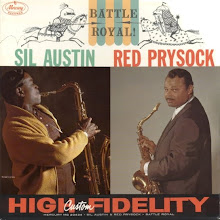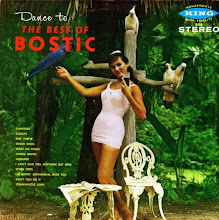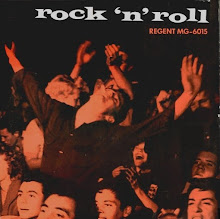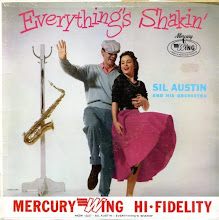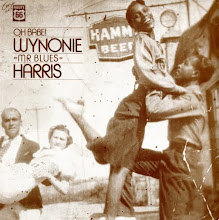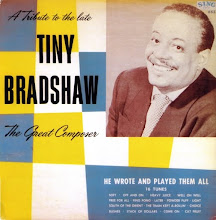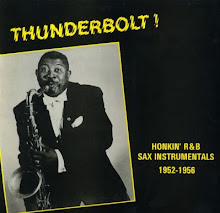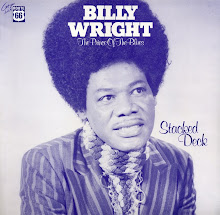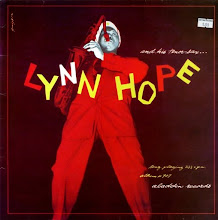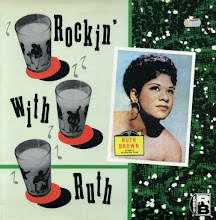
Side 1:
01. Dizzy Atmosphere
02. It's The Talk Of The Town
03. Leaping On Lenox
04. This Is Always
05. Bean-O
06. I'll Remember April
Side 2:
01. Moonlight In Vermont
02. Johnny Come Lately
03. You Go To My Head
04. Foggy Day
05. Tenderly
06. The Way You Look Tonight
Download from here:
This LP was originally released as King LP 395-506 in 1956:
The LP was re-released in 1960 as "Modern Jazz by Eddie Davis" with a new front cover similar to that used on this 1988 Sing issue.
Original issue on singles of the tracks from "Modern Jazz Expressions":
Bean-O / This Is Always (King 4801) - Eddie "Lockjaw" Davis Trio - May 1955
Punch / It's The Talk Of The Town (King 4813) - Eddie "Lockjaw" Davis Trio - July 1955
Together / Foggy Day (King 4863) - Eddie "Lockjaw" Davis Trio - December 1955
Scatter / The Way You Look Tonight (King 4904) - Eddie "Lockjaw" Davis Trio - March 1956
Tenderly / Dizzy Atmosphere (King 4928) - Eddie "Lockjaw" Davis Trio - June 1956
"Leaping On Lenox," "I'll Remember April," "Moonlight In Vermont," "You Go To My Head" and "Johnny Come Lately" first issued on "Modern Jazz Expressions."
Eddie "Lockjaw" Davis (the nickname came from the way he blew his sax) was born in New York City in 1921. His sax style was what was known as "mainstream", i.e. rooted in the big band swing era yet he played in varied settings, starting with big bands in the early to mid 1940s, especially with Cootie Williams and also in brief stints with Lucky Millinder and Andy Kirk. His first recordings with his own small group were made in May 1946 for Haven. In December 1946 his group recorded with bopper Fats Navarro for Savoy.
Further Eddie Davis small group recordings were made for Apollo in April 1947 and Lenox sometime in 1947 / 48. Somewhat surrealistically some of Eddie's Lenox sides turned up years later under the pseudonym Hen Gates on "rock and roll" compilations issued by the budget Plymouth label.
In 1948 (possibly during the AFM recording ban) Eddie cut four sides for Bob Shad's "Sittin' In With" label. In 1949 Eddie was involved in several R&B leaning sessions: with blues shouter Carl "King Karl" Davis for National; with Jesse Stone ("Cole Slaw") for Victor; with Eddie "Cleanhead" Vinson for King; and under his own name ("Mountain Oysters") with Bill Doggett also for King.
Eddie's next few recording sessions in 1950-51 were more on the jazz side with live sessions at Birdland being recorded with Gene Parrish, Miles Davis and Slim Gaillard. In October 1951 he was on a session with trombonist Benny Green for Prestige and both artists featured shortly afterwards on a live recording by a group led by Sonny Criss at the Shrine Auditorium in Los Angeles.
In 1952 Eddie joined the reformed Count Basie big band. A 78 rpm single release of "Paradise Squat" (Mercury 89104) featuring hot soloing by Eddie became a big hit for the Count whose use of the organ rather than the piano pointed the way for future Lockjaw releases.
Eddie's stay with Basie lasted into early 1953 (he would return in 1957) but even before splitting from the Basie outfit Lockjaw started recording with small groups which featured the organ - with Bill Doggett and then with Billy Taylor, both for Roost. Further sessions for Roost in 1953 and 1954 featured Eddie Bonnemere on piano and Charlie Rice on drums with some very tasty sax by Eddie.
In 1954 the Eddie Davis Trio lineup of Eddie on sax, Doc Bagby on organ and Charlie Rice on drums came together, recording "Just Too Marvelous" / "Heartaches" for Roost and sometime in the spring of 1954 the trio plus Sonny Stitt were recorded live at Birdland. Sessions for King commenced on April 11th 1955, with further sessions on April 19th and April 20th. Further King sessions were held in August 1955 and February 1956.
As can be seen from the release details above, these sessions resulted in a string of singles as well as this LP. The singles were reviewed in the R&B section of Billboard, so despite the album title "Modern Jazz Expressions" it is obvious that these sides were aimed at the jukebox crowd who liked to hear some good hot blowing (with the occasional ballad) on mostly easily recognizable standards.
When the next King session was held in July 1956 there was a change in personnel with Shirley Scott replacing Doc Bagby on organ. This was the start of a fruitful collaboration which would last until 1960, but that is a tale for our next post on Be Bop Wino.


























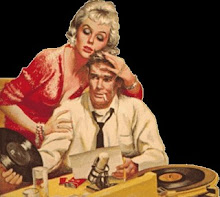


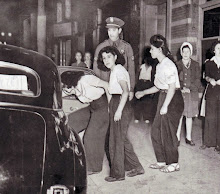



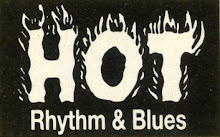
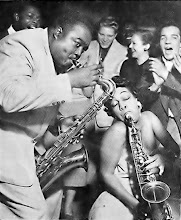





.jpg)


%2045%20-%201119B.png)














